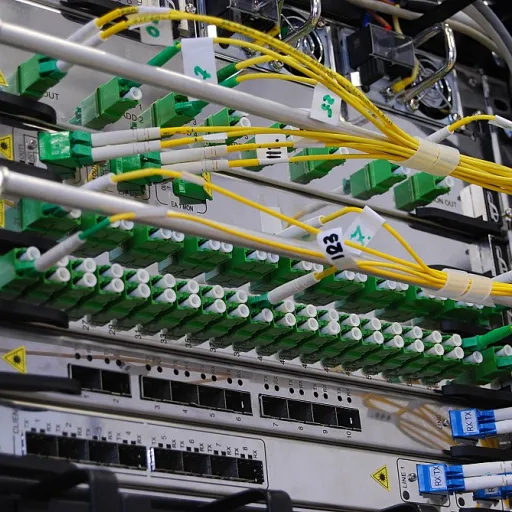
Understanding the shift to it infrastructure outsourcing
Why businesses are moving away from in-house infrastructure
The landscape of IT infrastructure is rapidly changing. More businesses are choosing to outsource infrastructure management rather than relying solely on their in-house teams. This shift is driven by the need to keep up with evolving technology, increased demand for security measures, and the pressure to reduce costs while maintaining high-quality services.
Traditionally, companies managed their own hardware, software, data centers, and support systems. However, as infrastructure components have grown more complex, the expertise required for effective management has also increased. Many organizations now find it challenging to maintain compliance with industry standards, ensure disaster recovery readiness, and provide round-the-clock help desk support using only internal resources.
Outsourcing infrastructure allows businesses to focus on their core business activities, leaving the management of critical systems and data to specialized providers. These providers offer managed services, cloud services, and other outsourcing services that deliver scalable solutions tailored to business growth. By leveraging the expertise of managed service providers, companies can ensure their infrastructure is secure, compliant, and up to date with the latest technology trends.
Another key factor is the rise of cloud infrastructure services. Cloud providers offer flexible, on-demand resources that help organizations scale quickly and efficiently. This model supports disaster recovery, enhances security, and reduces the need for significant capital investment in hardware and software.
As the future of software continues to evolve, the role of outsourcing infrastructure becomes even more critical. For a deeper look at how data management is transforming in this context, you can explore this resource on navigating the future of engineering data management.
Key benefits for software development teams
Unlocking Efficiency and Expertise for Development Teams
Outsourcing IT infrastructure is transforming how software development teams operate. By relying on external providers for infrastructure services, businesses can shift their focus to core business activities and innovation, rather than spending valuable time on infrastructure management and support. This shift enables internal teams to dedicate more energy to building products and delivering value to customers.
- Access to Specialized Expertise: Managed services providers bring deep knowledge in infrastructure components, security measures, compliance industry standards, and disaster recovery. This expertise is often difficult and costly to maintain with an in-house team, especially for smaller organizations.
- Cost Optimization: Outsourcing infrastructure reduces the need for significant investments in hardware, software, and data centers. Businesses can convert capital expenses into predictable operational costs, making budgeting easier and freeing up resources for business growth.
- Scalability and Flexibility: Cloud services and managed services allow teams to scale infrastructure up or down based on project needs. This flexibility supports rapid development cycles and helps teams respond quickly to changing market demands.
- Enhanced Security and Compliance: Providers implement robust security measures and help ensure compliance with industry regulations. This reduces the burden on internal teams and lowers the risk of data breaches or compliance failures.
- Reliable Support and Uptime: Outsourcing services often include 24/7 help desk and proactive monitoring, ensuring systems are always available and issues are resolved quickly. This reliability is crucial for maintaining productivity and meeting customer expectations.
By leveraging infrastructure outsourcing, software teams can focus on their core business and accelerate delivery timelines. The ability to outsource infrastructure management and support also means that internal resources are not stretched thin, allowing for better allocation of talent and attention to strategic initiatives. For more insights on how digital transformation is influencing telecom and IT management, explore navigating the digital direction in telecom management.
Challenges and risks in outsourcing IT infrastructure
Balancing Security, Compliance, and Control
Outsourcing infrastructure brings clear advantages, but it also introduces a set of challenges that businesses must address. One of the most pressing concerns is security. When infrastructure management is handed over to external providers, companies need to ensure that robust security measures are in place to protect sensitive data and systems. This includes everything from secure data centers and disaster recovery protocols to strict access controls and continuous monitoring. Compliance with industry regulations becomes more complex, as organizations must verify that their outsourcing partners meet all necessary standards for data protection and privacy.
Managing Service Quality and Support
Another challenge is maintaining consistent service quality. Relying on managed services or cloud services means that the business is dependent on the provider’s expertise and responsiveness. Issues like help desk support, timely updates, and proactive management of hardware and software can directly impact the performance of core business applications. If the provider’s support falls short, the internal team may struggle to resolve issues quickly, affecting productivity and customer satisfaction.
Hidden Costs and Vendor Lock-In
While outsourcing infrastructure can reduce upfront costs, there are potential hidden expenses to consider. These might include fees for additional services, unexpected upgrades, or penalties for exceeding usage limits. Over time, businesses may also face challenges with vendor lock-in, where migrating infrastructure components or data to another provider becomes costly or technically difficult. This can limit flexibility and make it harder to adapt to changing business needs.
Maintaining In-House Expertise and Oversight
As more infrastructure services are outsourced, there is a risk that the in-house team may lose critical expertise in infrastructure management. This can make it harder to evaluate provider performance or troubleshoot issues independently. Ensuring that the business retains enough knowledge to oversee outsourced services is essential for long-term success and business growth.
For organizations looking to strengthen their team’s skills in managing outsourced data environments, resources like this guide to the Databricks Certified Data Analyst Exam can be valuable for building internal capabilities alongside external partnerships.
The impact on innovation and agility
Driving Faster Innovation Cycles
Outsourcing infrastructure has become a catalyst for business innovation. By leveraging managed services and cloud solutions, software teams can focus on their core business rather than spending time on infrastructure management. This shift allows internal teams to dedicate more energy to developing new features and improving user experience. Providers often bring specialized expertise and up-to-date infrastructure components, which can accelerate the adoption of emerging technologies.Boosting Agility and Scalability
Modern businesses need to adapt quickly to changing market demands. Outsourcing infrastructure services enables rapid scaling of systems and resources. Cloud services, for example, allow teams to increase or decrease capacity without the delays and costs associated with in-house hardware and software upgrades. This flexibility supports business growth and helps teams respond to customer needs faster.Enhancing Security and Compliance
Security and compliance are top priorities for any organization handling sensitive data. Outsourcing providers invest heavily in security measures, disaster recovery, and compliance with industry standards. This level of protection is often difficult for an in-house team to match, especially for smaller businesses. Managed services also include regular updates and proactive monitoring, ensuring that infrastructure remains secure and compliant.Improving Support and Reliability
Reliable support is essential for maintaining business continuity. Outsourcing infrastructure management means access to 24/7 help desk services and expert troubleshooting. Providers operate advanced data centers and have dedicated teams to handle incidents, reducing downtime and minimizing the impact on business operations. This level of support is particularly valuable for organizations without the resources to maintain a large internal IT staff.- Faster deployment of new services and features
- Greater flexibility to adapt to market changes
- Stronger security and compliance posture
- Consistent, expert support for critical systems
Choosing the right outsourcing partner
Evaluating Provider Expertise and Service Offerings
When outsourcing infrastructure, the depth of expertise and range of services offered by a provider are critical. Look for providers with a proven track record in infrastructure management, cloud services, and managed services. Assess their ability to support your business with robust security measures, disaster recovery solutions, and compliance with industry standards. The right partner should demonstrate experience in managing both hardware and software systems, ensuring your data centers and infrastructure components are in capable hands.Prioritizing Security and Compliance
Security is a top concern when you outsource infrastructure. Evaluate how providers handle data protection, compliance requirements, and risk management. Ask about their security certifications, compliance with industry regulations, and how they manage sensitive data. A reliable provider will have clear policies for disaster recovery, regular audits, and transparent reporting to keep your business secure and compliant.Alignment with Business Goals and Growth
Your outsourcing partner should align with your core business objectives and support business growth. Consider how their services can help your internal team focus on core business activities, while they manage the underlying infrastructure. The provider should offer scalable solutions that adapt as your business evolves, whether you need additional cloud services, enhanced help desk support, or expanded infrastructure components.Transparent Costs and Service Level Agreements
Cost transparency is essential in infrastructure outsourcing. Review the provider’s pricing models and ensure there are no hidden fees. Service level agreements (SLAs) should clearly define response times, uptime guarantees, and support availability. This clarity helps your team manage expectations and ensures the provider is accountable for delivering consistent, high-quality services.Assessing Support and Communication
Effective communication and responsive support are vital for a successful outsourcing relationship. Evaluate the provider’s help desk capabilities, escalation procedures, and availability of dedicated account managers. Regular updates and open channels of communication help resolve issues quickly and maintain trust between your business and the outsourcing partner.- Check for expertise in managed services and infrastructure management
- Ensure robust security and compliance practices
- Look for alignment with your business growth and core objectives
- Review transparent costs and detailed SLAs
- Prioritize strong support and communication channels
Future trends in it infrastructure outsourcing
Emerging Technologies Reshaping Outsourcing
The landscape of infrastructure outsourcing is evolving rapidly, driven by new technologies and changing business needs. Cloud services continue to dominate, but now hybrid and multi-cloud strategies are gaining traction. Companies are seeking flexibility to move workloads between providers, ensuring better cost management and resilience. Artificial intelligence and automation are also transforming infrastructure management, from predictive maintenance to automated help desk support. These advancements help teams focus on core business goals while providers handle complex infrastructure components.Security and Compliance Take Center Stage
As more organizations outsource infrastructure, security measures and compliance with industry standards are becoming non-negotiable. Providers are investing heavily in advanced security systems, disaster recovery solutions, and data centers with robust compliance certifications. Businesses expect their outsourcing partners to deliver not just uptime, but also proactive risk management and regulatory support. This trend is pushing managed services providers to continuously update their offerings and expertise.Greater Emphasis on Strategic Partnerships
Outsourcing is no longer just about reducing costs. Businesses are looking for providers who can act as true partners, offering strategic guidance and tailored infrastructure services. This means more collaborative relationships, where the provider’s expertise complements the in-house team’s strengths. Providers are expected to support business growth, adapt to changing needs, and deliver value beyond basic infrastructure management.- Customized service agreements to match unique business requirements
- Joint innovation initiatives between internal teams and providers
- Shared responsibility for outcomes, not just service delivery





-large-teaser.webp)









